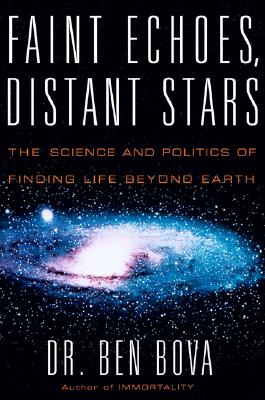

| FAINT ECHOES, DISTANT STARS The Science and Politics of Finding Life Beyond Earth Dr. Ben Bova New York: William Morrow, 2004 |
Rating: 4.5 High |
|||
| ISBN-13 978-0-380-97519-8 | ||||
| ISBN 0-380-97519-X | 335pp. | HC/GSI | $25.95 | |
| Page 1: | The quotation that heads this Prologue, like those that lead off each chapter, is in italics — and so are their sources. |
| It's fine for the quotation to be italicized; but the source and other identifying material should be typographically distinct.. |
| Page 50: | "Negotiations are underway for a French group to join, as well." |
| S/B "under way". |
| Page 67: | "The heat pouring from the Sun quickly began to effect the chunks of rock and metal that were condensing into planets around it." |
| S/B "affect". |
| Page 69: | The first paragraph talks about the birth of the solar system in present tense; the second, still on the same topic, changes to past tense. |
| This change of tense is improper. Both should be present tense, or both should be past tense. |
| Page 72: | "After hundreds of millions of years of such cosmic violence, the solar system was cleared of most of the dangerously unstable planetesimals, leaving the sedate group of planets and moons we have today, gliding smoothly through mostly empty interplanetary space, with only an occasional meteor or comet to remind us of the mayhem that once racked the Sun's newborn family." |
| Word choice: S/B "wracked". |
| Page 85: | "Astronomers call them, prosaicly, Trans-Neptunian Objects (TNOs)." |
| Spelling: S/B "prosaically". |
| Page 130: | "In those days before wireless radio, some suggested that we should attempt to communicate with the hypothetical Martians." |
| S/B "wireless" or "radio" to avoid duplicative copying, which would be unnecessarily needless. |
| Page 134: | "No government has shown any interest in funding such a program, which would cost hundreds of times more than the robotic probes now underway." |
| S/B "under way". |
| Page 178: | "This was the first time organic compounds have been found on any of the planets of our solar system." |
| Incorrect tense: S/B "had been found". And it's a nit, but I would have said "any of the other planets" to avoid including Earth. |
| Pages 184-5: | The topic headings: "URANUS"; MAGNETOSPHERE"; "RINGS AND MOONS — AND CARBON" |
| These all look the same. Different styles should be used to differentiate the level-1 heading (Uranus) from those introducing that planet's features. (This applies throughout the book.) |
| Pages 207-8: | "The problem is basically distance. The distances between stars are enormous. Although light travels at some 300,000 kilometers per second, it still takes more than four years for light to span the distance between the nearest star, Alpha Centauri, and the Sun. Small wonder that the search for planets orbiting other stars did not find anything until a mere few years ago." |
| This is all true, but it's not the reason extrasolar planets have not been detected until recently. The reason is what Dr. Bova mentions earlier in the book: planets are so close to their stars that at the great distances those stars are from us, any planets appear to be blotted out by the star's brilliance in today's best telescopes. (In fact, we still can't see such planets with telescopes. But we will in a decade or two.) |
| Page 208: | "Besides, the prevailing explanation for how the solar system was created, the steller encounter hypothesis we examined in Chapter 6..." |
| Typo: S/B "stellar". (The word appears elsewhere, but is only misspelled here.) |
| Page 226: | "Meanwhile, at NASA's Ames Research Center, a more modest program aimed at detecting Earth-sized extrasolar planets is quietly underway." |
| S/B "under way". |
| Page 241: | "The The British astronomer and Nobel laureate Sir Martin Ryle..." |
| Repeated word: S/B "The". |
| Page 256: | "Once attributed to angels or other supernatural causes, in the mid-twentieth century, the general public was familiar enough with the idea of extraterrestrial life that UFOs—unidentified flying objects—came to be ascribed to alien visitors from other worlds." |
| Dangling participle. Fix it thus: "UFOs were once attributed to angels or other supernatural causes. In the mid-twentieth century, the general public was familiar enough with the idea of extraterrestrial life that UFOs—unidentified flying objects—came to be ascribed to alien visitors from other worlds. |

 To contact Chris Winter, send email to this address.
To contact Chris Winter, send email to this address.